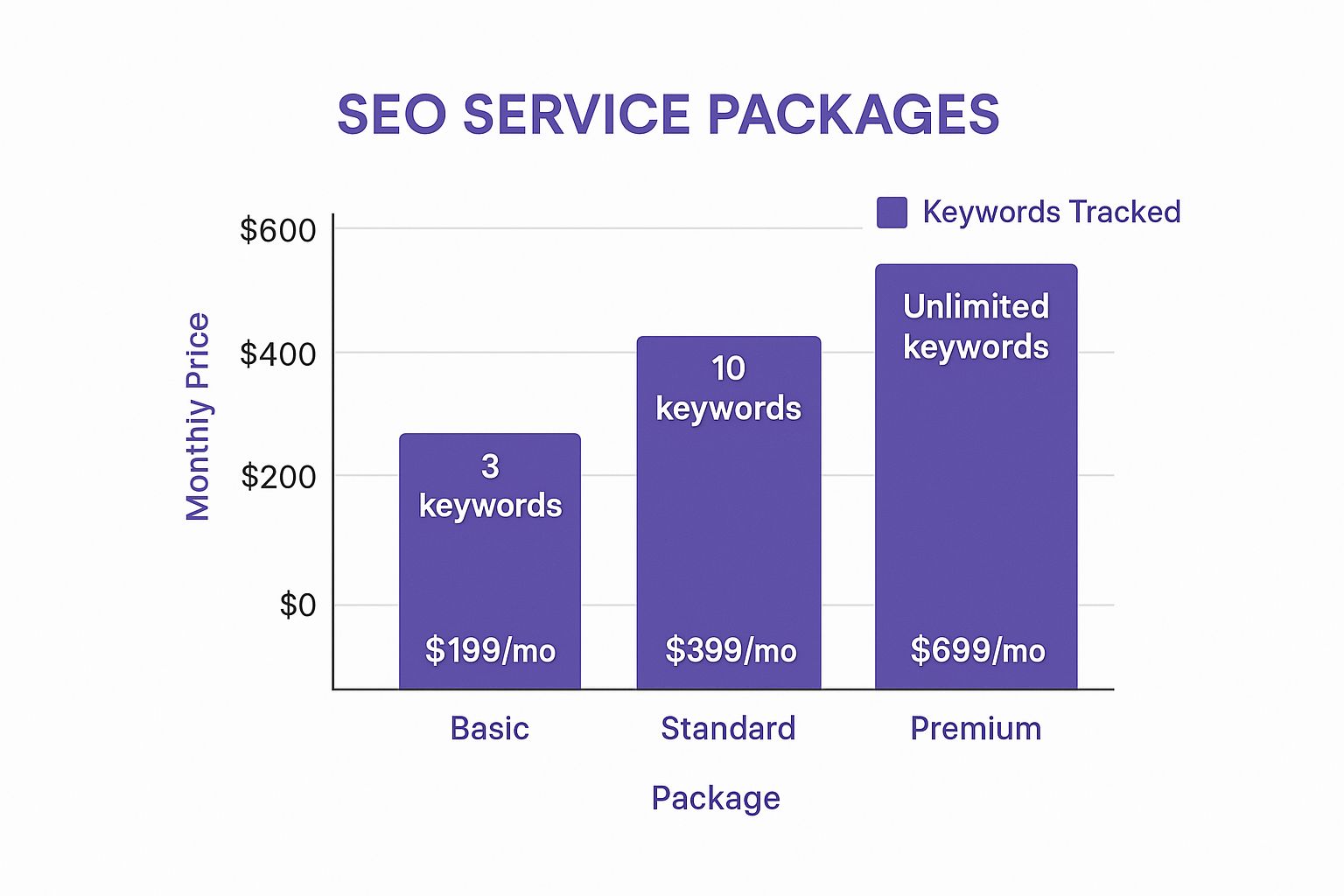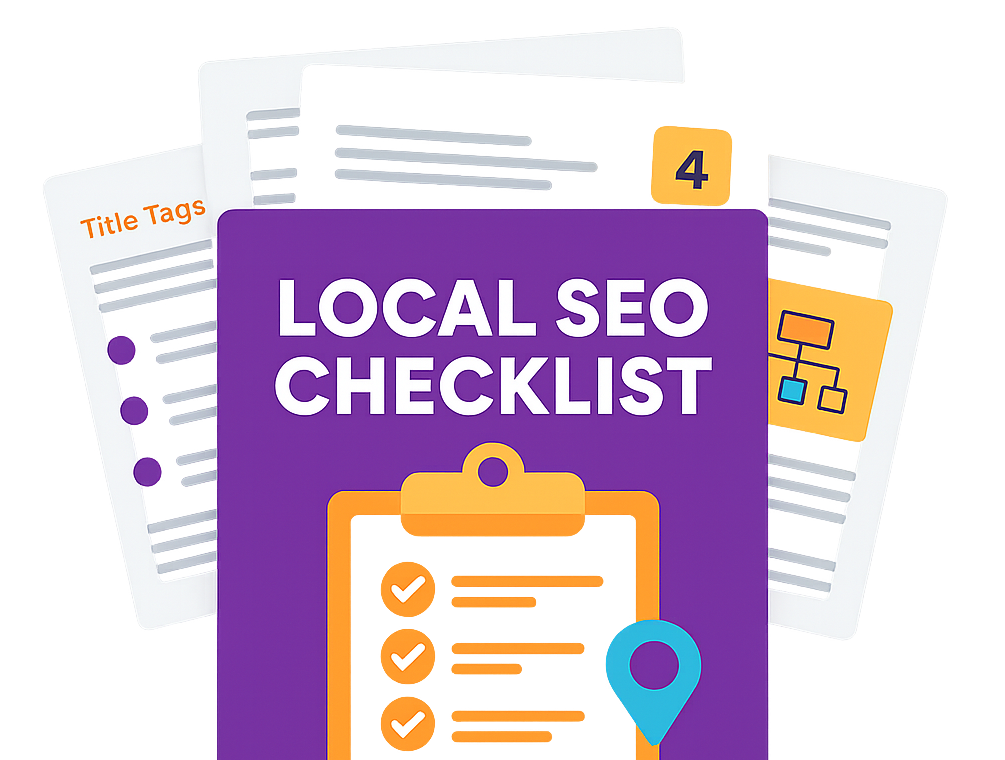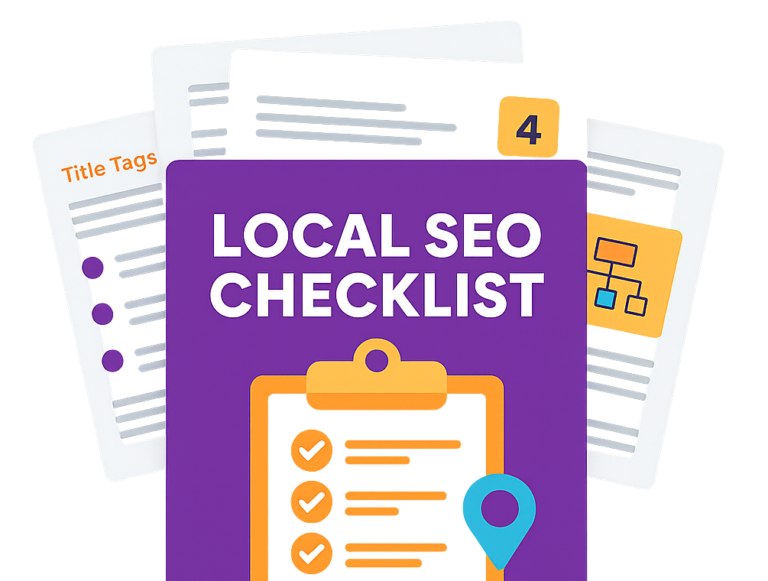Securing affordable SEO services for a small business isn't about finding the cheapest option. It’s about making a smart investment that actually delivers a return. For UK businesses where every penny counts, effective Search Engine Optimisation (SEO) is a powerful equaliser, building long-term digital value that brings in new customers time and time again.
Why Smart SEO Is Your Best Investment

Running a small business in the UK often feels like a constant juggling act, especially when it comes to your marketing budget. It’s easy to see SEO as just another expense, but that’s missing the bigger picture. Strategic SEO isn't a cost; it’s one of the most powerful investments you can make in your business’s future.
Unlike paid ads, which disappear the moment you stop paying, SEO builds a sustainable digital asset. A solid footing in organic search results creates the kind of credibility that paid advertising just can't buy. When customers find you naturally on Google, it tells them you’re a relevant and trusted authority in your industry.
Levelling the Playing Field
One of the best things about SEO is its ability to level the playing field. A local bakery in Cambridgeshire can genuinely compete with a national supermarket chain for local searches like "best sourdough bread near me." With the right strategy, your small business can own the search results that truly matter, capturing customers who are actively looking for exactly what you offer.
The data backs this up. In the UK, organic search is a massive driver of growth, responsible for 53.3% of all website traffic. With Google platforms driving over 90.5% of web traffic, ranking well isn't just nice to have—it's essential for attracting potential customers. This makes SEO a much more cost-effective way to get seen without pouring money into endless ad campaigns.
Building a Long-Term Asset
Good SEO work lowers your reliance on expensive advertising over time, which directly reduces what you spend to acquire each new customer. Every piece of optimised content and every quality backlink you gain adds to your website's authority, making it stronger and more resilient for the long haul.
"Think of SEO as digital property. Each improvement you make is like adding an extension to your shop or renovating the storefront. It increases the value of your asset and attracts more visitors for years to come, long after the initial work is done."
This snowball effect is what makes affordable SEO services for a small business such a wise move. You aren't just paying for temporary visibility; you are building a reliable channel for new business that delivers a measurable return for years. For a deeper look into how SEO can help smaller companies, exploring resources on SEO strategies specifically for small businesses can offer some brilliant insights.
To get a clearer picture of what all this involves, our comprehensive https://www.bare-digital.com/seo-hub/ offers foundational knowledge to help you get started. A strategic approach ensures your marketing budget works harder, fuelling sustainable growth and cementing your place in a competitive market.
Setting Clear Goals and a Realistic SEO Budget

Before you even think about getting quotes, the most important work happens in-house. You need to sit down and figure out what success actually looks like for your business. It's a simple step, but one that's so often missed. Without clear goals, you’re just throwing money into the wind, unable to measure your return or know if your SEO provider is delivering.
So, what does "winning" at SEO really mean to you? It’s almost never about hitting number one for some flashy, broad search term. True success is tying your SEO efforts directly to real-world business results.
Get specific. Are you a local joiner in Manchester who just needs the phone to ring more for kitchen fittings? Or maybe you run an online shop for handmade soaps, and your main goal is to increase online orders by 20% over the next twelve months. These are the kinds of tangible, measurable targets that give an SEO strategy a real purpose.
Translating Business Aims into SEO Objectives
Once your business goals are locked in, the next step is to translate them into specific SEO objectives. This creates a clear brief for any potential agency and gives you a benchmark to measure their performance against.
Here are a few real-world examples I see all the time with small businesses:
- Business Aim: Get more people through the door of my high street boutique.
- SEO Objective: Rank in the top 3 on Google Maps for "women's clothing Cambridge" and similar searches. We want to see a 30% jump in traffic from local search within six months.
- Business Aim: Generate higher-quality leads for my B2B consultancy.
- SEO Objective: Increase organic traffic to our main service pages by 50% and hit a 5% conversion rate on our "Request a Quote" form.
- Business Aim: Become the go-to expert in our niche.
- SEO Objective: Secure first-page rankings for ten long-tail informational keywords and land five high-quality backlinks from respected industry blogs.
How Much Should You Budget for SEO?
With clear goals in hand, you can tackle the budget question head-on. In the UK, monthly SEO retainers for small businesses vary quite a bit. You can expect to see prices starting from around £500 and going up to £2,000+ per month, all depending on how competitive your industry is and the scope of work needed.
A word of caution: affordable SEO isn't the same as cheap SEO. If you see a price that looks too good to be true, like under £300 a month, it should set off alarm bells. It often signals corner-cutting or, worse, risky tactics that could get your website penalised.
When figuring out your budget, it helps to get a feel for what your money actually buys. Spending a bit of time understanding typical SEO pricing structures will show you what different investment levels cover and help you set realistic expectations from the get-go.
Taking the time to set clear goals and a sensible budget is how you avoid one of the 5 common SEO mistakes small businesses make: investing money without a clear plan. This foundational work ensures you end up with a partner who aligns with both your finances and your vision for growth.
What Do You Actually Get with Affordable SEO Services?
The phrase "affordable SEO services for small business" can feel frustratingly vague. When you’re watching every penny, you need to know exactly what you’re paying for. So, let’s pull back the curtain and look at what these packages typically contain, so you can weigh up proposals with confidence.
It's important to realise that not all affordable SEO packages are created equal. The services included will depend entirely on your business, your goals, and your budget. A local plumber in Plymouth has completely different needs to a UK-wide e-commerce store selling handcrafted jewellery. Understanding the core components is the key to finding the right fit.
The Foundations of Affordable SEO
Most entry-level and affordable SEO plans focus on a core set of foundational activities. These are the absolute essentials for getting your website noticed by Google and potential customers. Think of it as building the ground floor of your digital presence before you start adding the fancy decor.
A typical package will often bundle several key services:
- Local SEO: This is the bread and butter for any business serving a local community. It involves optimising your Google Business Profile, building local citations (online mentions of your business name, address, and phone number), and targeting location-specific keywords like "hairdresser in Bristol."
- On-Page SEO: This covers all the tweaks made directly on your website. It includes tasks like improving title tags, writing meta descriptions, structuring content with proper headings, and making sure your images have descriptive alt text.
- Keyword Research: The provider will identify the search terms your target customers are actually using. An affordable service will likely focus on a smaller, more targeted set of keywords where you have a good chance of ranking.
- Basic Technical Audit: This is a health check for your website. It’s designed to find any technical glitches that could be hurting your rankings, like slow page speed or broken links.
The goal of an affordable package isn't to rank you for everything overnight. It's about building a solid, technically sound foundation that gives Google clear signals about what your business does and where you do it.
What to Expect at Different Price Points
As you might expect, the more you invest, the more you get. More comprehensive SEO packages will include a wider range of services, designed for more competitive markets or businesses with bigger ambitions.
The infographic below shows how SEO packages can scale, with more features and a broader scope available at higher price points.

This illustrates a simple truth: as your investment increases, so does the capacity for tracking more keywords and managing more complex websites, reflecting a more aggressive growth strategy. Seeing what best small business SEO tools an agency uses can also give you a clue about their capabilities.
So, how much should you budget? SEO costs can vary wildly, but here’s a rough guide for small businesses in the UK.
Typical Monthly SEO Costs for UK Small Businesses
| Business Type | Typical Monthly Cost (GBP) | Common Services Included |
|---|---|---|
| Hyper-Local Business (e.g., solo tradesperson, local cafe) | £150 – £400 | Google Business Profile optimisation, basic on-page SEO, local citation building, simple monthly report. |
| Small Local Business (e.g., dentist, solicitor, boutique shop) | £400 – £1,000 | All of the above, plus more in-depth keyword research, regular content creation (1-2 blog posts), technical monitoring, and detailed reporting. |
| SME/Regional Business (e.g., multi-location retailer, service company) | £1,000 – £2,500+ | Comprehensive local and national SEO, advanced content strategy, link building outreach, conversion rate optimisation, full technical SEO management. |
This table shows there’s a massive range, which is actually good news. It means there’s likely a plan out there that fits your budget. A sole trader can get started with a hyper-local plan for a couple of hundred pounds a month, while a more established SME might invest thousands for a national campaign. The key is finding a plan that delivers a measurable return for your business.
It's also crucial to stay aware of how search engine strategies are changing. Our guide on 2023 SEO trends can help you understand what modern, effective SEO looks like today. This knowledge will equip you to ask the right questions and ensure your chosen provider is using up-to-date, ethical techniques that won’t get you penalised by Google down the line.
Finding and Vetting the Right SEO Partner
Choosing an SEO provider can feel like a bit of a minefield, especially when you’re looking for affordable SEO services for a small business. You need a real partner who delivers results you can actually see, not just someone who drains your budget. It takes a bit of legwork, but getting this right means finding someone who’s committed to ethical, long-term growth for your business.
So, where do you even start? A quick Google search is one way, but I’ve always found that the best leads come from your own network. Ask other local business owners who they use and trust. A genuine recommendation from a peer is worth its weight in gold because it’s backed by real-world experience.
If you draw a blank there, online directories like Clutch or even freelancer platforms like Upwork can be solid options. Just make sure you do your homework and properly scrutinise their reviews and past work.
Asking the Right Questions During Consultation
Once you have a shortlist of potential agencies or freelancers, the consultation is where the magic happens. This is your chance to separate the real experts from those just selling snake oil. Think of it less like a sales pitch and more like an interview for a critical role in your business. Because that's what it is.
Come prepared with a list of sharp questions that dig deeper than the surface-level stuff. Here are a few essentials I always recommend asking:
- Can you show me some examples of your work? Don't settle for vague promises. You want to see specific case studies, ideally for businesses similar to yours in size or industry.
- How do you approach link building? This one is a big deal. A trustworthy provider will talk about earning high-quality, relevant links through great content and genuine outreach. If you hear terms like "PBNs" (Private Blog Networks) or buying links in bulk, it’s time to politely end the call.
- What does your communication and reporting look like? You need to know how often you'll get updates and what they'll be tracking. Look for someone who focuses on what really matters—traffic, leads, and sales—not just vanity metrics like keyword rankings.
- How do you stay on top of Google's algorithm changes? The SEO world is always shifting. A true professional will be able to talk you through how they learn and adapt their strategies, not just stick to an outdated playbook.
Spotting the Red Flags
Just as important as knowing what to look for is knowing what to avoid. Some SEO providers prey on the anxieties of small business owners by making promises that are simply too good to be true.
The single biggest red flag is a guarantee of a number one ranking on Google. No ethical SEO professional can ever, ever guarantee this. Google’s algorithm is a complex, constantly evolving beast, and anyone claiming they’ve "cracked the code" is not being straight with you.
Other warning signs include a total lack of transparency about their methods or an over-emphasis on rock-bottom prices (think packages under £200 a month). If they can’t give you clear, understandable answers to your questions, that’s another sign to be wary.
A true partner will take the time to educate you and be open about their entire process. The goal is to find a skilled partner who invests in your success, not just a low-cost vendor ticking boxes.
How to Measure Your SEO Success and ROI

Pouring money into affordable SEO services for a small business only makes sense if you see a real return. But if you’re not an SEO pro, how can you be sure your investment is paying off? Measuring your campaign’s performance and calculating its return on investment (ROI) is essential, and the good news is, you don’t need a degree in data science to do it.
The secret is to tune out the vanity metrics and focus on what actually drives your business forward. It's exciting to see your website climb the search rankings, but a top spot for a keyword no one searches for won't pay the bills. A good SEO partner will give you regular reports, but it’s up to you to understand what you're looking at.
Key Metrics That Actually Matter
When that monthly SEO report lands in your inbox, it's easy to feel overwhelmed by all the graphs and jargon. To cut through the noise, you only need to zoom in on a handful of performance indicators that tell the true story.
Here are the metrics you should actually be tracking:
- Organic Traffic Growth: This is the big one. Are more people finding your website through search engines like Google than before you started? A steady upward trend is the first clear signal that your SEO is working.
- Keyword Ranking Improvements: While rankings aren't everything, tracking your position for a small, curated set of high-value, commercial-intent keywords is vital. You want to see movement for the terms your ideal customers are actually typing into Google.
- Conversion Rate: This is where the magic happens. Of all the people coming to your site from organic search, what percentage is taking the action you want them to? This could be filling out a contact form, picking up the phone, or making a purchase.
- Click-Through Rate (CTR): Your CTR tells you how many people who see your website in the search results actually click on it. If this number is climbing, it means your page titles and meta descriptions are hitting the mark.
To get a better handle on this, check out our guide on the top metrics to measure on-page SEO success. It’ll help you have much more productive conversations with your SEO provider.
Calculating Your Return on Investment
Measuring ROI is all about connecting your SEO spend to cold, hard revenue. It might sound complicated, but a simple formula can give you a surprisingly clear picture. The first step is to assign a monetary value to each conversion. For an e-commerce site, this is easy—it’s just the average order value. For a service-based business, you can use the average lifetime value of a new client.
Let’s say you spend £500 a month on SEO. That investment brings in five new clients, and each client is worth £300 to your business. Your total revenue from SEO is £1,500.
Your ROI is calculated like this: ((£1,500 – £500) / £500) x 100 = 200%.
A 200% return is the kind of measurable outcome that turns SEO from a "nice-to-have" into a core part of a growth strategy. It allows you to make smart decisions based on real analytics, not just guesswork, giving you a serious competitive advantage. At the end of the day, using data ensures your marketing budget is actively fuelling your growth.
Still Have Questions About Affordable SEO?
I get it. Deciding where to put your marketing budget is a huge decision, and it’s only natural to have a few lingering questions before you commit. It’s better to ask now than to have misunderstandings later on.
Let's tackle some of the most common questions I hear from small business owners when they're thinking about affordable SEO services.
How Long Does It Take to See SEO Results?
This is the big one, and the honest answer is: patience is key. SEO is a marathon, not a sprint. While you might see some small, encouraging signs within the first three months—like popping up for a few more specific search terms—the real, impactful results take longer to build.
Realistically, you should budget for 6 to 12 months to see significant movement, especially for competitive goals like hitting the first page for high-value keywords. Think of affordable SEO as building a solid foundation for your business online, not just a quick fix. The exact timeline always depends on things like how competitive your industry is, the current state of your website, and what's included in your SEO package.
Can I Just Do SEO Myself?
Of course you can. DIY SEO is definitely an option, but you need to be realistic about what you're taking on. It's a massive time commitment to learn everything, keep up with Google's constant algorithm updates, and actually do the work correctly.
For most small business owners, that’s time you could be spending running your business.
An affordable SEO service is the shortcut. You get instant access to expertise, professional tools, and proven strategies without the steep learning curve. The real question is: what's more valuable—your time, or the monthly fee?
What’s the Difference Between Local SEO and National SEO?
Understanding this is crucial because it determines your entire strategy.
-
Local SEO is all about getting your business seen in a specific geographic area. It's vital if you have a physical location or serve a particular region—think plumbers, restaurants, or high-street shops. The focus here is on optimising your Google Business Profile and ranking for searches like "accountant in Cambridge."
-
National SEO targets an entire country. This is for businesses that aren't tied to a physical location, like an e-commerce store or an online consultant who can work with clients anywhere in the UK.
For most small businesses, affordable SEO packages rightly focus on local SEO. It's where you'll get the quickest and most relevant return on your investment.
Are “Guaranteed Rankings” a Red Flag?
A massive one. In fact, it's probably the biggest red flag in the SEO industry. No legitimate agency or professional can ever guarantee a specific ranking on Google. The algorithm is just too complex and changes too often for anyone to ethically make that promise.
Providers who guarantee rankings are almost always using risky "black-hat" tactics, like buying rubbish links or stuffing your pages with keywords. These tricks might give you a short-lived, fake boost, but they inevitably lead to a harsh penalty from Google. Recovering from that can be a long and expensive nightmare.
A trustworthy partner will guarantee their commitment to using ethical, best-practice strategies and will be transparent about the real performance improvements they're delivering.
Ready to invest in an SEO strategy that delivers real, measurable results without the empty promises? The team at Bare Digital specialises in creating bespoke, affordable SEO plans for businesses just like yours. We start with a free, no-obligation SEO Health Check to show you exactly where the opportunities are.
Get your free, customised SEO proposal from Bare Digital today!
Article created using Outrank








